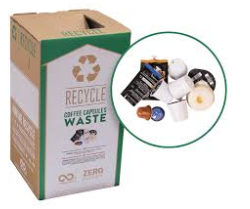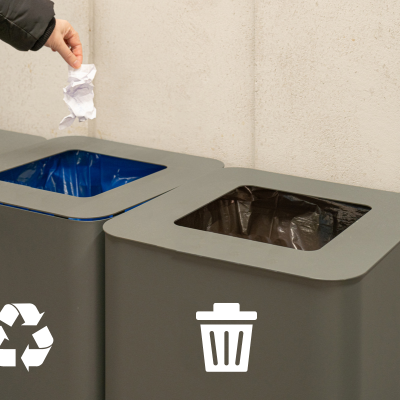Waste management is an important part of any business’ operations that can lead to lower operational costs, reduced emissions, improved operational efficiency, and contribute to a more sustainable economy.
Waste production and disposal are continually on the rise in Ontario, with 6,486,350 tonnes of non-residential sources of waste disposed of in 2020 (Statistics Canada, 2023). This is the carbon equivalent to emissions from 1,802,743 passenger vehicles or 3,3934,419 homes’ electricity use for one year.
Here are some waste management strategies you can implement with your team.
Diversion Projects
Waste diversion refers to the amount of waste that was going to landfills, but has been diverted to either recycling, organics, or has been reused.
Projects:
- TerraCycle:

- Offers recycling programs funded by brands, manufacturers, and retailers around the world to help collect and recycle hard-to-recycle waste.
- Choose from a selection of Zero Waste Boxes for what you want to recycle and send it back to TerraCycle when it is full.
- E-Waste Recycling
- When thrown into landfills, electronics have serious environmental impacts including contaminating water from heavy metals and toxic materials.
- Recycle or donate old, broken, or unwanted electronic equipment or computer technology.
- Places to drop off electronics: Staples, Enviro Depots, and Tech Wreckers for refurbishing
- Centralized Waste
- Remove personal garbage cans from desks and workspaces and have a centralized waste and recycling collection area. People are more likely to properly sort their waste when others are around.
- With proper signage for sorting waste, stream contamination is also less likely to occur.
- Composting:
- 30% of all waste that goes into landfills is organic and can be composted. Therefore, purchasing an outdoor composter is a great way to encourage employees to divert organic waste.
- Composters can be purchased from an EnviroDepot or hardware stores.
Reduction Projects
Waste reduction focuses on reducing overall waste being produced, to begin with. Ideally, you want to start by reducing as much waste as possible and then try to find ways to divert the remaining waste your organization produces.
Projects:
- Supply Chain Management:

- Review your organization’s supply chain and operations to mitigate waste production and improve overall sustainability.
- This can include switching suppliers and changing operations to involve sustainably sourced materials.
- Zero-waste Cleaning Supplies:
- Switch cleaning products to refillables to reduce the amount of single-use plastics being sent to landfills.
- This includes having soap dispensers, hand dryers, or hand towels in washrooms and kitchens.
Another strategy to implement would be conducting a waste audit to determine the quantity and composition of your business’ waste stream. Reviewing operations and waste generation gives an understanding of the types of waste materials entering and exiting your facility, and will help you establish a baseline.
It begins with a 24-hour or more sampling of garbage, recycling, and organics generated at your organization. Next, the waste will be classified by material type in each stream and weighed. The audit will analyze the existing systems and level of efficiency in separating waste streams and achieving waste diversion. Finally, a report will be produced that compiles all the data and findings from the waste audit.
Waste audits are a great starting point to allow your business to make strategic decisions on how to allocate resources for source reduction and improved recycling programs.
Resources:
Guide to Conducting a Waste Audit
How can we help?
Green Economy London will support your business to track, reduce, and divert waste by collecting and analyzing consumption data and give you a breakdown year over year. We then will help you set reduction targets and continue monitoring progress. We want your business to achieve sustainability goals and reduce emissions so we encourage, celebrate, and recognize measurable progress.
Join the network of businesses that are driving the low-carbon economy and reach out to kaitlin@londonenvironmnet.net to learn more about how we can help your business track emissions.
Reference:
Statistics Canada. (2023). Table 38-10-0032-01. Disposal of waste, by source. doi: https://doi.org/10.25318/3810003201-eng
